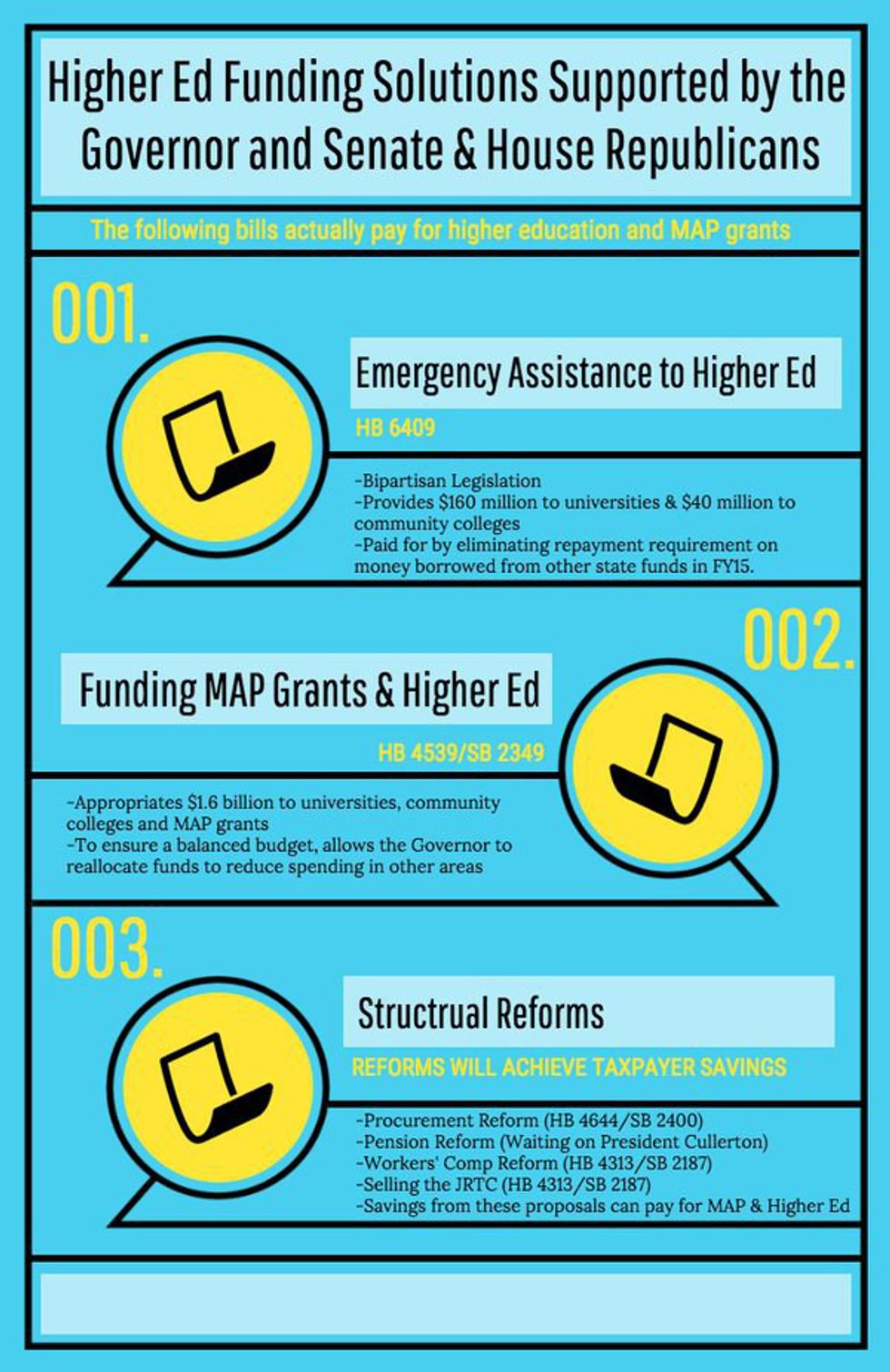As a transfer student, I’ve only been at Eastern Illinois for 18 months, but in just that short amount of time I’ve grown so much. The advisors, professors, and faculty have been wonderful and pushed me to be a better writer, citizen, and student. I’ve been continuously challenged, and I like to think I’ve risen to the challenge. While this alone is enough to be grateful for, more than anything I’m grateful to EIU for their decision to stand by their students during the Illinois budget crisis.
I’ve watched them care, and I’ve watched good, hardworking people sacrifice more than they should ever have to for the sake of the students. EIU Staff are choosing to accept pay deferrals and forgo raises to help ensure EIU's "continued operations through the end of fiscal year '16" (EIU President Glassman). Additionally, my heart breaks for the hundreds of workers that were laid off, as Glassman stated, "solely because we have not received a fiscal year 2016 state appropriation" so that students like me can continue my education.
Recently, a student wrote An Open Letter to Governor
Rauner and Illinois State Legislatures about how “public universities are
struggling without a state budget.” Catie Witt, a student at Eastern Illinois
University says “the questions everyone are asking are why can’t the state pass a budget
and when will the state pass a budget?”
The stakes are high. As the budget
crisis hits its ninth month, universities are faced with more than just
layoffs, furlough days (staff working for free), pay cuts, and reducing
extra-curricular activities and events, universities like Chicago State University
are at risk of closing down.
The state budget includes the funds
appropriated for MAP grants, which provides
tuition assistance students from low-income families. Caught in the middle of
this crisis are grant recipients. Halfway through the year most universities mailed out letters warning students that they will
have to come up with the money that
was previously promised to them with the hopes that it will be refunded to them
once the budget passes. As a result, "more than 1,000 low-income
students" cannot come up with the thousands of dollars on such short
notice and are forced to drop out or decide not to enroll in the next
semester.
Without the appropriation of the
funds, only a few universities like Eastern Illinois have chosen pay students’ grants
out of the universities own pockets:
“We assured our MAP eligible students we would credit their accounts for their fall MAP awards while we awaited reimbursement for the state. This was a cost of four million dollars. Our faculty forwent a raise that had already been negotiated freeing up approximately 500,000 to keep the adjunct faculty from being laid off. It was tough, but we pulled together for our students and our institution.” – Glassman to IL State Senate (3:25).
Had I been at any other university, I would have been one of the students forced to not enroll in the
next semester. I would have had to leave with only a year left, wondering when
I would be able to return to school to finish my degree. I will forever be grateful to EIU
for their decision to stand by their students and recognize that students like
me base our decision to enroll at a university on our financial situation and
that as a child of a single working-class mother, I cannot pull the $4,248 of
funds I was promised out of thin air in only a few months’ time.
Many people,
including President Glassman never “imagined that nine months into the fiscal
year we would still have no appropriation. We now stand at a critically
threatening precipice having been forced to operate without state funding for
almost an entire year. Parents are literally driving Illinois
across the borders to pursue higher education in neighboring states. By the
time Illinois public universities finally get the funds we need to support our
students, we are not sure how many students will be left." As a student of Eastern Illinois who has overheard student conversations about trying to transfer out of state or move out of state after graduation every day since the budget impasse started, I must agree. For the students that remain, they
find their faith in the state legislature dwindling with each month that passes
without a budget.
“Thestate is literally starving its universities to death. Potential campus closures and layoffs appear to be considered wins or loses in a political chess game. We are encouraged to be vocal with our distress and at the same time warned to be quietly patient. Proposal after proposal is filed and lobed across the aisle only to meet quick defeat or eventual demise.” - President Glassman (7:07-8:00)
Like President Glassman, “I respectfully ask our lawmakers what exactly is the end game here?” and like many students at Eastern I wonder why the state has failed to pass a budget for nine months. As far as I can tell, the root of the problem is an inability to compromise. The two parties continue to play chicken, blaming each other as all across the state, the residents that are the most vulnerable (abuse victims, elderly, low-income families and students) are paying the price as this impasse continues.
I also find it ironic that Rauner who claims to be greatly concerned with Illinois attracting residents and keeping residents in the state as taxpayers seems unconcerned with the fact that he is alienating an entire generation of young voters and tax payers (not to mention their families). Governor Rauner tweeted recently that he "supports funding higher ed and MAP grants, but we need to find a way to pay for them." (@GovRauner, March 17, 2016). Attached to his claim of "supporting the funding of higher education and MAP grants" was an info-graph showing his plans for how to solve the Illinois budget crisis. If you look under the section for MAP grants, you will see "to ensure a balanced budget, allow the Governor to reallocate funds to reduce spending in other areas."
While both sides of the “how to fix the budget and the state of Illinois” debate have valid beliefs and concerns, this country was founded on a system of checks and balances and consequently on the idea of compromise (article 1, section 7). Rauner’s solution is unconstitutional because it bypasses the checks and balances that are in place for very good reasons. Billy Bolt states that Governor Rauner’s GOP bill “is really only a ‘rob Peter to pay Paul’ bill that gives the Governor the power to sweep funds from other programs without identifying what programs he is sweeping funds from” (Feb. 6, 2016).
Personally, I and many others would like to know where exactly the Governor is reducing spending from and where he is allocating that savings to. If this proposal allows Rauner control over how much and where money goes without having to disclose the details, consequently eliminating anyone's ability to disagree, make revisions or suggestions, or have any input in the Governor’s financial decisions, than it only eliminates the stalemate by eliminating the voices of others.
While Gov. Rauner may genuinely believe that he can fix the budget if he had more control, one only has to look at the history of unethical governors in Illinois to understand why opening such a precedent could have negative long-term consequences and is not a viable answer to the state's budget problems. Yes we need these services, but we also need to find ways to pay for them. So lawmakers should meet up, talk, determine how to pay for these services (without bypassing the system of checks and balances and without withhold funds as a bargaining chip), and stop refusing to talk to one another like petulant children or a bitter divorced couple.
While the state is not required to hold more sessions, the fact that the general assembly hasn't held more meetings during such a critical situation has frustrated residents. Thankfully lawmakers are finally meeting again Monday, April 4th, and if the Chicago rally April 1st makes enough of an impression, perhaps a budget will finally be passed. Passing a budget is their job, and the state’s failure to do is not only unethical, arguably unconstitutional, but also increasingly immoral as more and more vulnerable lives are damaged (some irreparably), as a result of this impasse.
I pulled all President Glassman quotes from a video shared by FundEIU. For those who would like to hear President Glassman's speak about EIU to the IL Senate in Springfield March 10, 2016 and hear his answers to questions about the state of EIU right now click on the links to watch the video. While it is not necessarily exciting to watch, it is informative. There is a lot of speculation and misinformation circulating the Eastern campus about Eastern Illinois, I encourage students to stay as informed as possible.
"As of March 11th, 2016, 177 civil service employees will be laid off. Of these 177 employees, some are single parents, some are dealing with health issues, and in some cases the layoffs will effect both husband and wife in the same household. I wish to be clear that these positions are being eliminated not because they are unessential, we need them, and not because we are right sizing the university. That has already been accomplished. It is solely because we have not received a fiscal year 2016 state appropriation. The effects of the budget impasse are real for EIU and they are devastatingly real to those 177 Illinois tax payers and voters who have in many cases dedicated their entire careers to the students of Eastern" - Glassman (5:00- 6:30).
Also, please go to #FundEIU or FundEIU's Facebook to speak up about how the budget impasse has effected you as some (like Kim Turner) are doing already. Also, feel free to comment below as well.
Fund EIU's recent twitter responses:


























